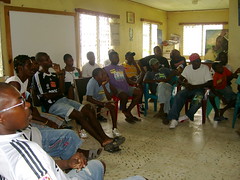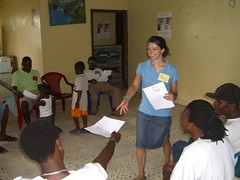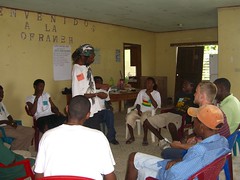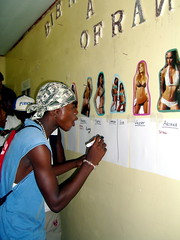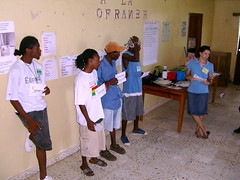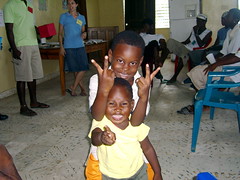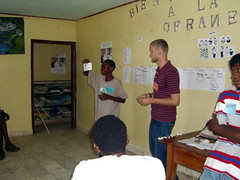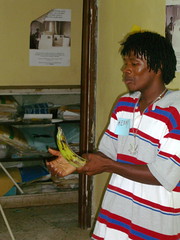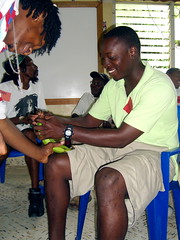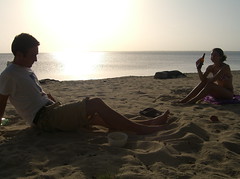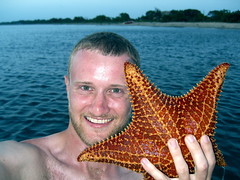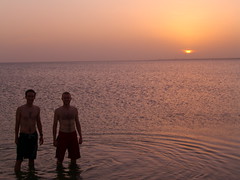First off, some good news: mail has started arriving in the States! I got emails today from two different people saying that letters and cards had arrived. Finally.
Today I went to the office of the Empresa Hondureña de Telecomunicaciones (HONDUTEL) to get information on activating the phone line in my apartment and getting internet service. First they guy at the counter tried to send me away saying they didn't know anything about the house where I lived, but I kept talking and finally they admitted that yes there was a physical line there and I could pay to have it activated. He then gave me a few forms that I had to go out and make copies of myself, at my own expense.
Finally, as we were filling out the forms, I started asking for details on the pricing of the phone line and "unlimited" dialup internet. The Hondutel Guy was somewhat evasive of my questions. Finally I asked him to just tell me what the monthly rate would be for phone plus internet. He said, "About 300 Lempiras a month, plus connection charges." Connection charges? "Oh, you get your first 200 minutes of calls free, then we charge 35 centavos a minute." So, the internet is technically unlimited, but after less than 3.5 hours of online time, I have to start paying by the minute for the connection to the call center that is less than 2 blocks from my house? "Yes, but 35 centavos is cheap! It's practically free!" Actually it isn't. 35 centavos a minute works out to 21 Lempiras ($1.10) an hour, and since dialup is so slow, I'll probably be connected for several hours a day.
I told the guy that I would be signing up with Tigo wireless internet and left the office, wondering how business like HONDUTEL maintain their existence. Of course, that is currently an empty threat because Tigo oversold wireless connections and are stretched beyond capacity so they aren't signing up any new wireless customers for the time being.
Lastly, I want to put a request out to folks who are reading this blog. I've been using my kitchen a lot, but my repertoire is pretty limited. I didn't bring down any cookbooks. Could y'all send me recipes? The simpler the better. Many ingredients are not available here. Beans, rice, corn, flour, oatmeal, fruits, and veggies are easy to get. There are some spices and canned/packaged foods, too. A recipe for Chili, for example, would be perfect. Thanks!
Thursday, July 26, 2007
Odds and Ends
Posted by
Raphael
at
10:40 AM
4
comments
![]()
Sunday, July 22, 2007

Since arriving in Trujillo, I've sent a number of postcards and letters to friends and family in the States. As far as I know, none have arrived. Meanwhile, many of you have sent me letters and packages, all of which have arrived within 3 weeks of their postmark. Today, I went to the post office and asked them if they knew why none of my letters had reached their destinations.
The guy behind the counter pulled out a La Prensa article from June 27. It was titled ¿Para qué te escribo?. The lead sentence said that no international mail had been delivered for the last 25 days because of a problem with air freight contracts. The article went on to explain that on June 1, the contract between HONDUCOR (the Honduran Postal Service) and two airlines, TACA and COPA, expired. HONDUCOR planned on changing carriers to Federal Express, but had not signed a contract with them. So there was no one to fly mail out of the country.
Bags and bags of mail were piling up in the storerooms below Toncontín Airport. The director of HONDUCOR, Nimia Valladares, could not be found for comment. Postal employees at the HONDUCOR offices at Toncontín Airport said she was in the old offices in downtown Teguz, but the employees there said she was at Toncontín.
According to the assistant to the director of HONDUCOR, air transport was to resume the day the article was published, but according to other sources many details in the contract with Fedex had yet to be worked out. Who knows if the mail has even started going out now, 3 weeks after this article was published.
In the States, this kind of breakdown of a key government service would have been headline news that day it happened. And really, it wouldn't ever happen. Here in Honduras, it wasn't even written about until the crisis had gone on for 25 days. And even then it was just a small article in the back of the newspaper. Gotta love Honduras!
UPDATE: As of July 13, mail was still having problems getting out of the country.
Posted by
Raphael
at
6:19 PM
2
comments
![]()
Tuesday, July 17, 2007
Settling In
Little things happen that buoy my confidence and comfort. For one, I am able to hold much longer and more involved conversations in Spanish. And for the first time, I've been able to successfully translate a bit of wit and humor as well. I have honduran friends who I can call to hang out with on weekends. Work-wise, the success of the Men's Health workshops has given me a sense of momentum to take on more ambitious projects. Lastly the fact that I have a place to call my own, where I can be by myself and cook for myself, has also been a great help.
On Thursday we attended a presentation in Tocoa by the UN on the progress in Honduras toward the Millennium Development Goals. The UN presenters arrived over 2 hours late, and they didn't have enough snacks and water to go around, so I was faint with hunger by the time we finally got out. We headed straight to a Chinese restaurant. It took us over an hour to get a platter of fried rice. The service there was so bad that even the Hondurans were complaining.
The Men's Health Workshop on Saturday went wonderfully. We had 30 participants, up from 17 last week. Apparently people told their friends. The attendance and positive feedback we got make me think that there is great potential for doing ongoing work with men here in Trujillo.
The participants were also very enthusiastic. My favorite part of the workshop was when Mary was leading a discussion about intimate activities a couple can do that don't run the risk of transmitting HIV. All the easy ones (kissing, hugging, massages) were shouted out right away, but there was more hemming and hawing as the ideas became more intimate. One guy started to say, "If the guy touches her part....and she touches his part..." and another guy jumped up and shouted, "Mutual masturbation!" The whole group started cheering and applauding and high-fiving him as if he had just kicked a game-winning goal.
After the workshop Mary and I made Jambalaya for a little dinner party with our sitemates and Johnny, who came over from Casa Kiwi to visit. It was a night like so many back home: good company, good food, good music. It's such a seemingly small thing, but those are the things that make it possible to be happy.
This week is a bit slow as a couple of my counterparts are out of town. I'm taking advantage of the downtime to work on my apartment and do laundry. I will be traveling to Santa Rosa de Aguan on Thursday to give a hygiene charla with Agua Pura. Santa Rosa is a fairly isolated community a ways east of here. It
Posted by
Raphael
at
2:59 PM
1 comments
![]()
Monday, July 9, 2007
Men's Health, Day 1
Saturday, July 7th was our first Men's Health workshop, something I've been organizing with the Foro Nacional de SIDA. We did half of the full workshop yesterday, and will do the other half next Saturday. In a nutshell, it went great! We had about 20 people show up (more than I expected, we had quite a full house) and they were all very enthusiastic.
At about 8:30am, Mary and I went to the OFRANEH Office to start setting up chairs for the workshop. We were ostensibly supposed to start at 9, but I had worked over an hour of leeway into the schedule since I assumed we would probably be starting about an hour late. People started to shop up around 9:30. By 10:00 most of the participants had arrived, and we got started.
Mary started us off with Lenguaje de Hombre (Man's Language), an activity about slang words used in the street, and why we use them.
After that, I ran a game called ¡Diga la Verdad, Hombre! (Tell the Truth, Man!) where participants had to answer questions about HIV, condom use and sexuality and then scramble to change seats, musical chairs style (there was always one less seat than the number of participants).
After a short break, I ran another activity called Chicas Calientes (literally Hot Girls, but it's a double entendre because caliente can also mean horny). The guys really got into this (because there were 8 scantily clad women posted up on the wall), and learned about the chain of transmission and how it's not possible to tell if someone has HIV only by looking at them.
Mary continued with Fluidos Pegajosos (Sticky Fluids), a lesson on which fluids transmit HIV, and the different situations and actions that carry risk of transmitting the infection.
Alan's kids really wanted to participate in the activities; I distracted them with my camera. They loved to pose for pictures.
While Kenny set up for the last activity, I did a quick activity called Si Da, No Da (a play on SIDA, the spanish acronym for AIDS).
Lastly, Kenny (one of my counterparts at FONASIDA) did Póngase el Sombrero (Put on the Sombrero) a lesson in how to use a condom properly. First 10 volunteers had to organize the steps to properly use a condom. Then, Kenny demonstrated the proper way to put on/remove a condom, and lastly the whole class practiced with plantains.
We got a lot of really positive feedback from the participants, and they all said they would come again next week, and bring their friends! I'm not exactly sure how we'll fit more people if that does happen, but I figure that's a good problem to have.
After the workshop, Mary and I were in need of some R&R, so we went to a beachside restaurant/hostel outside of Trujillo called Casa Kiwi (it's owned by New Zealanders). We met up with Johnny, and Irish med student who has been volunteering with Agua Pura down in Choluteca. We swam, watched the sunset, and played with an enormous starfish.
Posted by
Raphael
at
1:00 PM
0
comments
![]()




